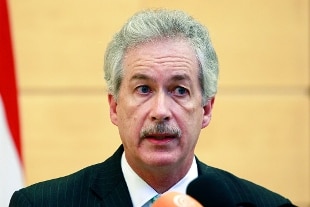Share
January 11, 2021 Joe Biden chooses William Burns to lead the CIA.
A career diplomat and head of the American delegation in secret negotiations with Iran, the figure of Burns marks a departure from the four years of the Trump administration and his repeated attempts to politicize the Central Intelligence Agency.
The appointment is part of the bipartisan fears about the politicization of the intelligence apparatus.
A veteran of diplomacy such as the 64-year-old Bill Burns is attributed above all the quality of mediator with no small political flair, so much so that for a long time he was talked about as a possible secretary of state (choice then fell on Anthony Blinken, who is also considered one of the 'fathers' of the ayatollah nuclear agreement).
"He is an excellent diplomat, who has decades of experience on the global scene", said Biden himself, according to whom Burns "shares my basic belief, that a secret service must be apolitical".
In fact, Burns - with a BA from La Salle Universiity in Philadelphia and a doctorate from Oxford - boasts a whopping 33 years in the US diplomatic service.
He joined the Foreign Service in 1982, was special adviser (and confidant) to practically all the American secretaries of state of the last glimpse of history, from Warren Christopher to Madeleine Albright, passing through Colin Powell, Condoleezza Rice, Hillary Clinton and John Kerry.
A career in constant growth: he was deputy secretary of state under Obama (therefore with Biden vice president), before then American ambassador to Russia and Jordan, to retire from public service in 2014, when he chose to take on the post of president of the Carnegie Foundation for International Peace, a prominent Washington-based foreign policy think-tank.
With Blinken and National Security Advisor in pectore, Jake Sullivan, Burns is not only linked by common experience at the negotiating table in Geneva with the Iranians, but there is a common belonging to Biden's closest circle, even if his experience appears extraordinarily vast.
Before serving as deputy to Hillary Clinton, Burns had served under both Republican and Democratic presidents, from time to time as deputy under-secretary on eastern affairs, as special assistant to the State Department, as ministerial advisor for political affairs at the embassy of Moscow, as director of policy planning staff, and also as senior director for Southeast Asian affairs at the National Security Council.
In addition to having received more or less all the honors that can be obtained in the diplomatic field (including the "Memorial Award for Conflict Resolution and Peacemaking" and the nomination as "Diplomat of the year" in 2013 by the Foreign Policy magazine) and as well as being on Time magazine's list of "50 Most Promising American Leaders Under 40", he is considered extremely flexible and versatile: as all his biographies proudly report, Burns is fluent in Russian, Arabic and French.
This is enough to make commentators say that obviously the Russian and Iranian fronts will remain the hottest dossiers that the CIA has in hand, and the first issue is precisely that of the nuclear deal, from which the Trump administration had unilaterally emerged in the 2018, despite the strong resistance of the European signatories to the agreement.
Biden has already made it clear that he intends to reopen the table: the problem is to understand first what the Iranian intentions are, and this is what the agency is for.
As for the extremely difficult relations with Putin, the experience as ambassador to Moscow represents an ace in the handle of the 'new' CIA.
Someone doubts that his management of the CIA is completely apolitical: his ideas were clarified in the book "The Black Channel: a Memoir of American Diplomacy and the Case for Its Renewal", from 2019, in which he not only recalls his "days on the front line", including the first adventurous phases of negotiations with Tehran's emissaries, but in which he expresses his firm conviction that the US must return to a multilateral approach.
In other words, it calls for the "renewal" not to say a "reconstitution" of American diplomacy, a leading role in line with the thinking of Biden, Blinken & Sullivan, which is not Trump's "America First" but a return to the global scene as a force of mediation.

